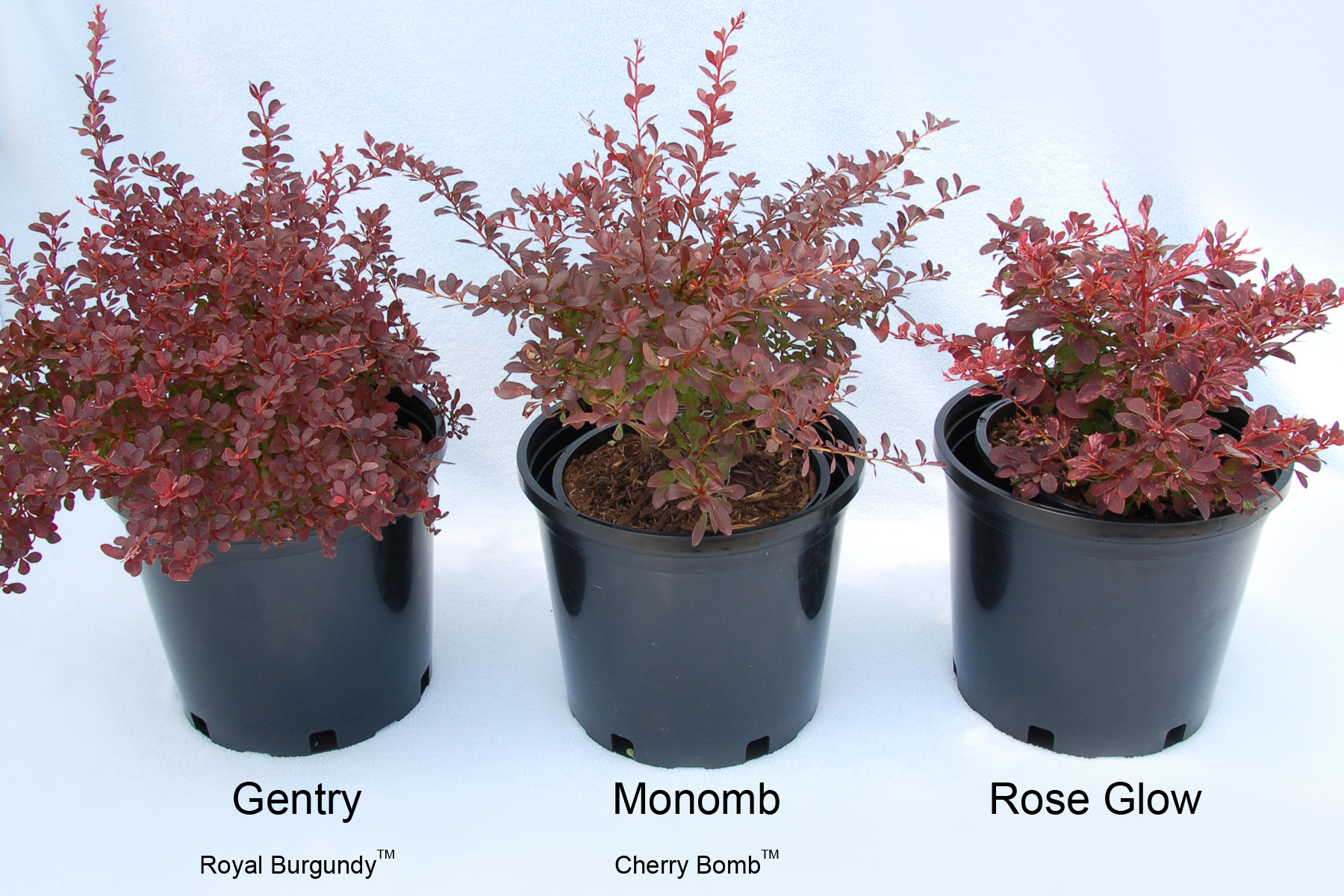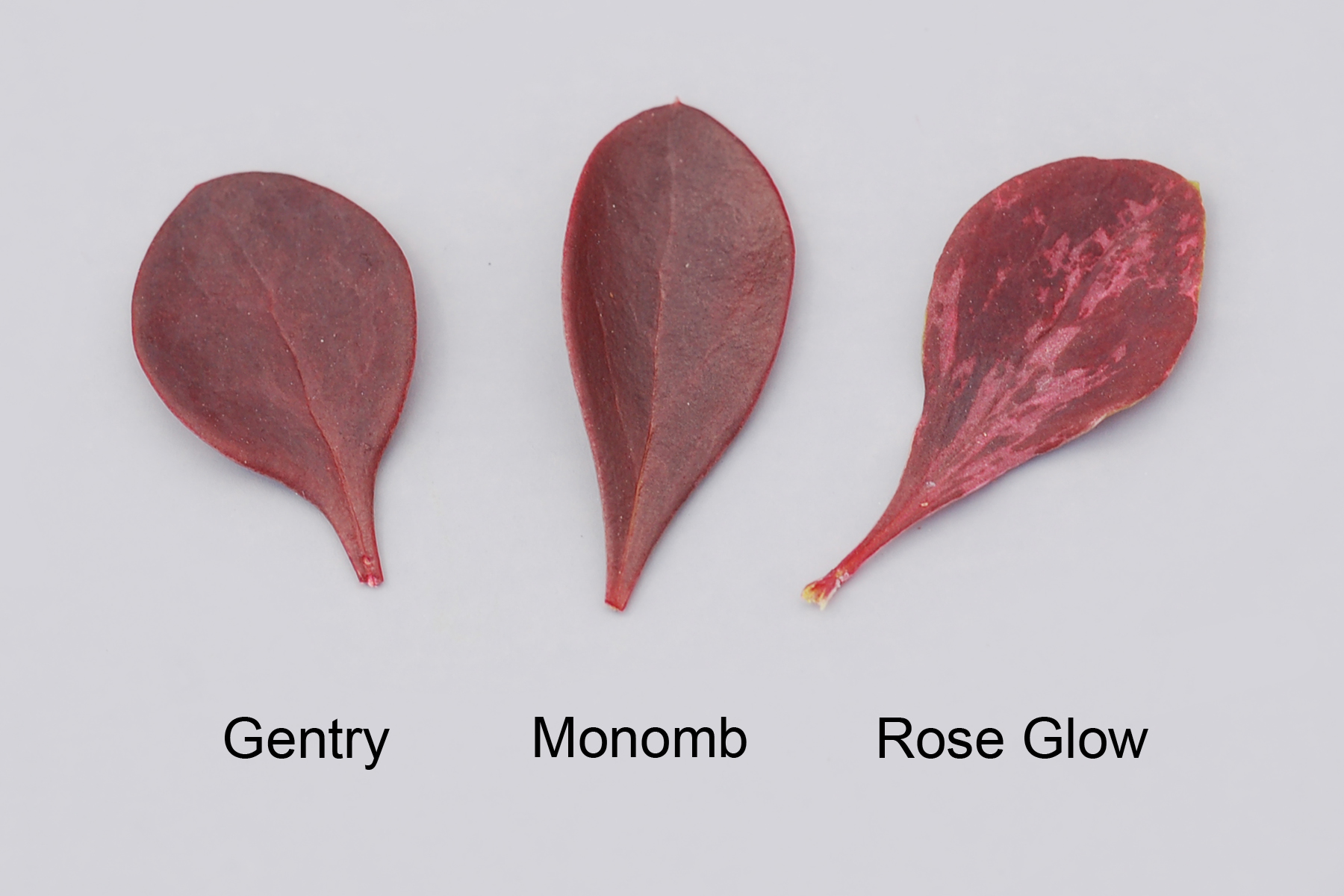Gentry
| Denomination: | 'Gentry' |
|---|---|
| Trade name: | Royal Burgundy |
| Botanical Name: | Berberis thunbergii |
| Applicant/Holder: |
Leo E. Gentry Wholesale Nursery Inc. 11251 South East 232nd Gresham, Oregon 97080 United States of America |
| Breeder: |
Leo E. Gentry, Leo E. Gentry Wholesale Nursery Inc., Gresham, United States of America |
| Agent in Canada: |
Oyen Wiggs Green & Mutala LLP 480 - 601 West Cordova Street Vancouver, British Columbia V6B 1G1 Canada Tel: 604-669-3432 |
| Application Date: | 1999-12-13 |
| Application Number: | 99-1929 |
| Grant of Rights Date: | 2009-02-17 |
| Certificate Number: | 3446 |
| Grant of Rights Termination Date: | 2027-02-17 |
Variety Description
Varieties used for comparison: 'Monomb' (Cherry Bomb) and 'Rose Glow'
Summary: The foliage of 'Gentry' is very dense while that of 'Monomb' is moderately dense and that of 'Rose Glow' is moderate to dense. 'Gentry' has smaller leaves than both reference varieties. The leaves of 'Gentry' are more obovate than both reference varieties, which are more elliptic. The newly opened leaves of 'Gentry' are brown red while those of 'Monomb' are brown purple and those of 'Rose Glow' are brown purple with irregular red pink splash-like markings.
Description:
PLANT: compact to bushy-upright growth habit, very dense foliage
STEM: brown red, medium thickness, ribbed
BARBS: medium to dark red, medium size
NEW LEAF (UPON OPENING): almost orbicular, brown red
NEW LEAF (FULLY EXPANDED): upper side is greyish dark brown with brown purple at base and along mid-rib, lower side is reddish grey with brown green at base and along mid-rib
MATURE LEAF: alternate arrangement, obovate, broadly obtuse apex with mucronate tip, attenuate base, greyish/reddish dark brown on upper side, dark green when shaded, no pubescence
Origin & Breeding History:
'Gentry' was discovered at the Leo Gentry Wholesale Nursery in Gresham, Oregon, United States in 1989. It was found growing in a bed of 15,000 container grown Barberis thungbergii of the variety 'Crimson Pygmy'. The plants in this bed were propagated by vegetative cuttings taken from several thousand mature 'Crimson Pygmy' plants growing at the nursery. Selection of 'Gentry' was based on the colour of its leaves, its ability to grow in full sun and resistant to sunburn or scalding with mid-day waterings.
Tests & Trials: Trials for 'Gentry' were conducted in a polyhouse during the summer of 2007 in St. Thomas, Ontario. The trial included a total of 10 plants each of the candidate and reference varieties. All plants were grown in 7.5 litre containers during the summer of 2007. Observations and measurements were taken from 2 year-old plants, 10 plants of each variety, on July 18, 2007. All colour determinations were made using the 2001 Royal Horticultural Society (RHS) Colour Chart.
Comparison tables for 'Gentry' with reference varieties 'Monomb' and 'Rose Glow'
Leaf length (including petiole)(cm)
| 'Gentry' | 'Monomb' | 'Rose Glow' | |
|---|---|---|---|
| mean | 3.1 | 3.5 | 4.3 |
| std. deviation | 0.38 | 0.57 | 0.36 |
Leaf width (cm)
| 'Gentry' | 'Monomb' | 'Rose Glow' | |
|---|---|---|---|
| mean | 1.2 | 1.5 | 1.8 |
| std. deviation | 0.12 | 0.08 | 0.18 |
Colour of leaf (RHS)
| 'Gentry' | 'Monomb' | 'Rose Glow' | |
|---|---|---|---|
| newly opened | 182A | 183A | 183B with irregular 52B/C splash-like markings |
Click on image for larger view

Japanese Barberry: 'Gentry' (left) with reference varieties 'Monomb' (center) and 'Rose Glow' (right)
Click on image for larger view

Japanese Barberry: 'Gentry' (left) with reference varieties 'Monomb' (center) and 'Rose Glow' (right)
- Date modified: